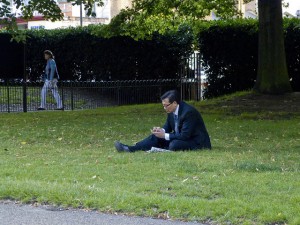In a previous post, I wrote about how adopting a ‘Power Pose’ (i.e. a more expansive posture) can improve performance and reduce stress, especially before important meetings or job interviews.
One of the leading researchers on this topic is Amy Cuddy, an associate professor of Business Administration at Harvard Business School.
Ms. Cuddy decided to research the question of posture and its impact on performance even further.
While her previous research had addressed the question of whether adopting an expansive body posture or ‘Power Pose’ could positively impact performance before meetings or interviews, Ms. Cuddy decided to ask the next logical question – Will adopting a low power posture negatively impact performance?

Ms. Cuddy, in a paper she co-wrote with Maarten Bos, examined this very topic. In this paper. the authors wrote:
“We examined whether incidental body posture, prompted by working on electronic devices of different sizes, affects power-related behaviors.”
The authors continued:
“Just before walking into a meeting, many of us are hunched over our smart phones, reading and responding to emails, and reviewing last minute notes. Following this frenzied attempt to efficiently manage our time, we have to be on our game in the meeting. Recent research documenting the benefits of adopting expansive (vs. contractive) body postures – “power posing” – suggests that hunching over our smart phones before a stressful social interaction, like a job interview, may undermine our confidence and performance during that interaction.”
Cuddy and Bos went on to discuss the details of their study. You can read the full version here.
At the end of their study, Cuddy and Bos concluded that hunching over our cell phones and adopting a low power posture does indeed negatively impact our performance. By adopting a low power posture before a stressful event like a meeting or job interview, we actually feel less powerful and less confident.
The authors concluded:
“Many of us spend hours each day interacting with our electronic devices. In professional settings we often use them to be efficient and productive. We may, however, lose sight of the impact the device itself has on our behavior and as a result be less effective. We suggest that some time before going into a meeting, and obviously also during it, you put your cell phone away.”
In a future post, I will address exactly what to do prior to an interview to ensure that you really do feel more poised and more confident….


